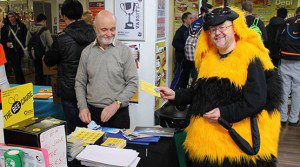Get a glimpse into the amazing world of bees
University of Worcester and Friends of Earth got students involved in a petition calling the government to action to save British bees in danger of extinction from a further decline.
Students were greeted in the SU on Monday by a buzzing atmosphere and a friendly bumblebee eager to help them find out more about how they can help keep the community bee-friendly.
Mr Ronald Lee, from the Worcestershire Wildlife Trust, volunteered to cheer up everyone around campus with his colourful outfit to raise awareness of the threats bees are under in Britain and to encourage students to make their gardens a great environment for the little buzzers.
“Today went very well, we had over 100 postcards filled in and a lot of young people got involved. Education is massively important and to have the opportunity to teach people what they can do as individuals plays an important part in what we do,” said Mr Lee.
Students also got free wildflower seeds Papaver rhoeas or Common Poppy to plant in their gardens or window boxes around their homes.
Mr Lee said: “It would be good for people to understand that parts of their gardens should be put aside for bee friendly plants.”
Planting specific plants rich in nectar helps bees find the food they need and in addition to helping the bees, you get a colourful window view as well. Poppies only produce pollen (not nectar), but are really good for bumblebees and some solitary bees.
They might be tiny, but bees are an essential part of a healthy environment, helping most of our fruit and veggies grow. The decline we’ve seen is really worrying for the economy, as it would cost farmers £1.8 billion a year to pollinate crops without bees!
By signing a postcard as a pledge, students added their voice to Friends of the Earth, the charity organisation asking the Bees Minister Lord de Mauley to take into account the bee decline in the UK. If weren’t on campus on the day, no need to worry, you can always add your voice to the cause through Friends of Earth.
The petition is calling for the Government to give clear answers on how a ban on neonicotinoid pesticides, which are connected to bee decline, will be enforced. In addition, it asks for more information and advice to be given to growers on safer measures of pest controls.
Protecting British bees could save millions of pounds and secure food supplies for the future and it can be done by implementing a good National Pollinator Strategy by the government.
So, if you feel like you can lend a hand, why not try planting some bee friendly plants in your garden or even just choosing to buy your honey produced by beekeepers near you? You can also find amazing gifts like beeswax candles and sweet-smelling soaps and balms, all provided by the local community.

[…] student. People have been very interested in why we have been giving out the seeds and having the Friends of the Earth Bee stall next door has helped; it’s been good to explain about pollination and the impact on agriculture if we […]
We always enjoy doing a FoE stall at the University of Worcester. Thanks to all those bee friends who signed our postcards. It was good to hear so many stall visitors were taking action to create a bee friendly environment.
It felt wonderful signing the postcards to save the bees and it’s very promising to see a variety of different students care/show interest in the petition.
I hope you have viewed our ‘Pimp My Milk Float’ post, as there is a cameo appearance from Ronnie himself dress in a bee costume.
The number of British native dark honey bees was nearly wiped out by a mite in the early 1920’s and since then queen bees have been imported from Italy, Holland etc. and have bred with our native bees. The bee hives in the University of Worcester conservation area contained the native bees sourced from a Worcestershire farmhouse where they have had a large colony in the wall for many years.